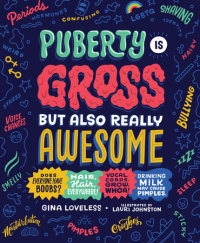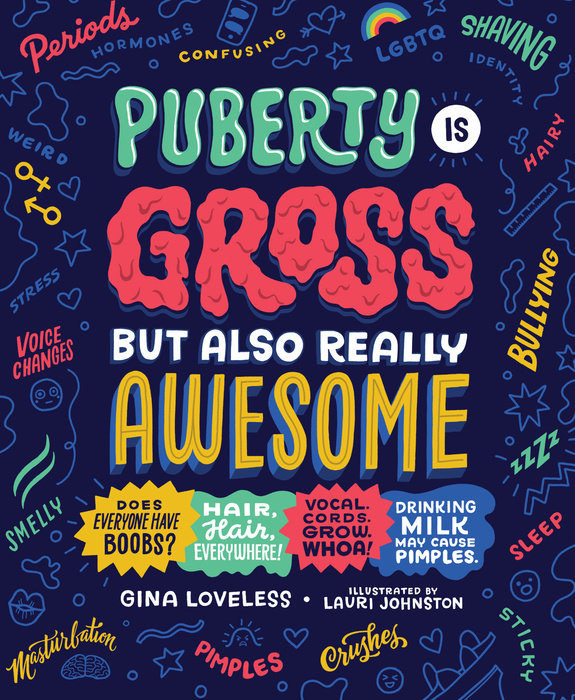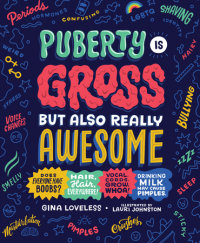Puberty Is Gross but Also Really Awesome
A first-of-its-kind inclusive puberty guide that celebrates the good and completely awful parts of puberty. Filled with jokes and countless facts to put this stage in perspective--this book is bound to be every kid's new best friend!
Puberty . . . is pretty gross for pretty much everyone. It's a smelly, hairy, sticky, and (worst of all) totally confusing time! But did you know there's a lot about puberty that makes it REALLY AWESOME?
Get the whole picture with this honest, humorous, and empowering survival guide to the tween years. It's packed with straighforward illustrations, easy-to-understand scientific information, interesting studies, and tips from experts, covering everything from breast development and gender identity to acne and mental health.
No matter your gender, sexuality, or race, this book is for you. Never shying away from the tough stuff, this utterly modern take on puberty is the resource this generation needs! Welcome to modern puberty--it's transformative, kind of gross, but undeniably AWESOME!
An Excerpt fromPuberty Is Gross but Also Really Awesome
This book was written to be as INCLUSIVE as possible. Inclusive, in this case, means the book was written for every single kid to understand their way through puberty. This is a time when kids are surrounded by so much change that it can be weird and gross and scary, but also kinda cool. Puberty Is Gross, but Also Really Awesome wants to make sure as many kids as possible can pick up this book and find themselves in it. For instance, you’ll find a variety of adult caregivers used in examples throughout the book. Sometimes a mom is the adult; other times it's a foster dad. There are grandparents and aunts and uncles. This is because kids live many different kinds of lives. Some have parents and some of them have guardians. If you don’t relate to the type of adult mentioned because, say, your uncle didn’t pick out any of your clothes when you were a kid but your mom did, then swap in the adult who takes care of you.
Another way the book aims to be inclusive is by using the terms ASSIGNED MALE and ASSIGNED FEMALE. As you’ll learn in chapter 9: I Is Who I Is and I Like Who I Like (About Gender Expression, Gender Identity, and Sexual Expression) on page 69, not all people identify with the sex they were assigned at birth. There are transgender and gender non-conforming tweens, who are in the middle of transitioning or have transitioned to a different gender than the one they were assigned at birth. And there are kids experiencing gender dysphoria, who are unsure about their gender and whether or not it’s the same one they were assigned when they were born, which might be causing them anxiety, No matter what, your body changes are based on the sex you were assigned at birth. So be on the lookout for those phrases and use whatever the doctor assigned you when you were born as a way to know what’s happening with your body during puberty.
No matter what you identify as or who takes care of you, you’re all going through the same wacky time together. Hopefully, this book helps you realize how universal puberty is—like, literally universal. There are examples from all over the globe that show how alike you all are.
Don’t worry, you’re still uniquely you, but puberty is something that every single kid you know goes through, and there’s something REALLY AWESOME about that.
Body Changes and the Tooth Fairy
Four Ways That Losing Teeth Is a Lot Like Puberty
1. You know how you lost (or are still losing) your baby teeth so that your adult teeth could grow in? That’s a little like how puberty works. The same way your adult teeth grew into your mouth, the rest of your body will start to grow and form into your adult body.
2. When new teeth come in, it is actually called teeth eruption. Your shiny adult teeth push and erupt through your gums and into your mouth. That’s a little like puberty too, since it comes on all of a sudden and your body is kind of pushing and pulling itself in different ways to get to its adult form. Don’t worry, nothing’s going to fall off during puberty. (But if it does, get to a hospital right away!)
3. Was losing your teeth a little painful, and maybe even a little scary? That feeling can pop up during puberty too. Except, instead of it being physical pain, it usually comes on as emotional pain. In some ways, that can be tougher. But, just as with physical pain, there are different things you can do to feel better. (Check out the chapters on confidence, bullying, and mental health to learn more.)
4. Finally, here’s your first wild fact: Depending on when you get your first baby tooth, you can guess, roughly, when your first permanent tooth will come in. If your first baby tooth comes in a month earlier or later than the average first tooth’s appearance, then your first adult tooth will come in either 4.21 months early or late. That’s a little like puberty too, because your first changes during puberty set the rest of puberty.
Remember, with every baby tooth you lost, it was probably a little easier to deal with losing the next one. And you’ll get through puberty that way too. As the years pass, new challenges will come your way, and you’ll keep adapting and finding ways to handle them. Hey, if you found a way to handle losing a tooth, you’ll find a way to get through this.


